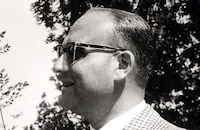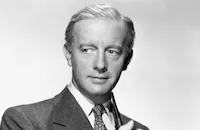He was arguably the most refined, and versatile of all English film stars in the history of British cinema.
Sir John Mills, the Oscar®-winning actor whose film career spanned over 70 years, died on April 23 of natural causes in London. He was 97.
Born Lewis Ernest Watts Mills in Norfolk, England on February 22, 1908. His father was a headmaster of a village school in Suffolk, where Mills was raised.
After secondary school, he worked as a clerk in a corn merchant's office while acting in amateur dramatic societies. Ever ambitious, he relocated to London in
1928 to find more work as an actor.
He took tap-dancing lessons and made his stage debut as a chorus boy in The Five O'Clock Girl at the
London Hippodrome in 1929. Later that year, he
joined an acting troupe that toured India and the Far East with a repertory of modern plays, musical comedies and Shakespeare. It was during this tour when he scored his big break - he was spotted by Noel Coward while in Singapore and promptly taken under the playwright's wing when he returned to London in 1931.
On his return, he starred on the West End (London's Broadway), in Coward's Cavalcade and earned the lead in a production of Charley's Aunt. His song and dance talents came in handy for his film debut, an early British musical-comedy The Midshipmaid (1932). His biggest hits over the next few years would all fall into the genre of light
comic-musicals: Britannia of Billingsgate (1933), Royal Cavalcade (1935), and Four Dark Hours(1937). He scored a his first big part as Robert Donat's student in the MGM backed production Mills went on to play Robert Donat's Goodbye, Mr.
Chips (1939). He developed some more heft to his acting credentials that same year when he made his debut at the celebrated Old Vic Theatre as Puck in A Midsummer Night's Dream.
He served briefly in the Navy, 1940-41, during World War II before receiving a medical discharge. When Mills returned to the screen, he began a great turn as the atypical sturdy, dignified Englishman ("English without tears" went the popular phrase of the day).
He starred as a stalwart lead in a amazing string of hit films: In Which We Serve (1942), We Dive at Dawn (1943), This Happy Breed (1944), The Way to the Stars (1945), and Waterloo Road (1945). Although Mills was ever dependable, they did not show his breakout talents until he starred as Pip in David Lean's gorgeous adaptation of Charles Dickens' Great Expectations (1946). As the young orphan who morphs into a man of wealth and stature, Mills showed the depth as an actor by offering a finely modulated performance.
By the late '40s, Mills was a bona fide star of British films, and over the next decade the strong roles kept coming: as the ill-fated Robert Falcon Scott in Scott of the Antarctic (1948); Bassett, the handy man who tries to help a troubled child (the brilliant John Howard Davies) of greedy, neglectful parents in the superb domestic drama The Rocking Horse Winner (1950); an overprotective father who gets trapped in a murder yarn in Mr.
Denning Drives North (1952); a fine Willie Mossop in David Lean's Hobson's Choice (1954); an impressive "against-type" performance as a Russian peasant in War and Peace (1956); a sympathetic police inspector coaxing the trust of a juvenile (his daughter Hayley) who knows the facts of a murder case in the underappreciated Tiger Bay (1959); a rowdy Australian sheep shearer in Summer of the Seventeenth Doll (also 1959); and arguably his finest performance - a Best Actor award at the Venice Film Festival for a hard-as-nails army colonel who fears the loss of control over his regiment in Tunes of Glory (1960).
The mid-60s saw an isolated effort as a film
director: Gypsy Girl (which starred his other daughter Juliet - who would later find fame on US television in Nanny and the Professor (1970-72); and showed the development of Mills into a charming character actor: the working-class patriarch in the modest comedy The Family Way (starring Hayley as his daughter); and a terrific comic bit as a murderous Lord who tries to kill off his kin for the family inheritance in Bryan Forbes The Wrong Box (all 1966).
By the '70s, his film work slowed considerably, but he was always worth watching: an Oscar winning performance as a mute villager in David Lean¿s study of the Irish troubles Ryan's Daughter (1970); as the influential General Herbert Kitchener Young Winston (1972); and as a driven oil driller in Oklahoma Crude (1973). With the exception of a small role in Sir Richard Attenborough's Ghandi
(1982 - where he was credited as Sir John Mills after his knighthood in 1976), and a regrettable cameo in the deplorable Madonna comedy Who's That Girl
(1987).
Very little was seen of Mills until recent years, where the most memorable of his appearances included:
Old Norway in Hamlet (1996); as the stern chairman opposite Rowan Atkinson in the hit comedy Bean (1997); and - in a daring final role for his proud career - a nonagenarian partygoing cocaine user in Stephen Fry's bawdy social satire Bright Young Things (2003)! Mills is survived by his wife of 64 years, the novelist and playwright Mary Hayley Bell; his daughters, Juliet and Hayley; son, John; and several grandchildren.
by Michael T. Toole
The Vicious Circle
Cast & Crew
Read More
Gerald Thomas
Director
John Mills
Dr Howard Latimer
Noelle Middleton
Laura James
Derek Farr
Ken Palmer
Roland Culver
Detective Inspector Dane
Wilfrid Hyde-white
Robert Brady
Film Details
Also Known As
Circle, The, Vicious Circle
Release Date
1959
Production Company
Romulus Films Ltd
Technical Specs
Duration
1h 24m
Sound
Mono
Color
Black and White
Synopsis
Director

Gerald Thomas
Director
Cast

John Mills
Dr Howard Latimer
Noelle Middleton
Laura James
Derek Farr
Ken Palmer

Roland Culver
Detective Inspector Dane

Wilfrid Hyde-white
Robert Brady

Mervyn Johns
Dr Kimber

Lionel Jeffries
Geoffrey Windsor
Rene Ray
Mrs Ambler
Diana Lambert
Nurse Kay
Lisa Daniely
Freida Veldon
David Williams
Sergeant Lewis
John Gordon
Surgeon
Film Details
Also Known As
Circle, The, Vicious Circle
Release Date
1959
Production Company
Romulus Films Ltd
Technical Specs
Duration
1h 24m
Sound
Mono
Color
Black and White
Articles
Sir John Mills (1908-2005)

Sir John Mills (1908-2005)
He was arguably the most refined, and versatile of all English film stars in the history of British cinema.
Sir John Mills, the Oscar®-winning actor whose film career spanned over 70 years, died on April 23 of natural causes in London. He was 97.
Born Lewis Ernest Watts Mills in Norfolk, England on February 22, 1908. His father was a headmaster of a village school in Suffolk, where Mills was raised.
After secondary school, he worked as a clerk in a corn merchant's office while acting in amateur dramatic societies. Ever ambitious, he relocated to London in
1928 to find more work as an actor.
He took tap-dancing lessons and made his stage debut as a chorus boy in The Five O'Clock Girl at the
London Hippodrome in 1929. Later that year, he
joined an acting troupe that toured India and the Far East with a repertory of modern plays, musical comedies and Shakespeare. It was during this tour when he scored his big break - he was spotted by Noel Coward while in Singapore and promptly taken under the playwright's wing when he returned to London in 1931.
On his return, he starred on the West End (London's Broadway), in Coward's Cavalcade and earned the lead in a production of Charley's Aunt. His song and dance talents came in handy for his film debut, an early British musical-comedy The Midshipmaid (1932). His biggest hits over the next few years would all fall into the genre of light
comic-musicals: Britannia of Billingsgate (1933), Royal Cavalcade (1935), and Four Dark Hours(1937). He scored a his first big part as Robert Donat's student in the MGM backed production Mills went on to play Robert Donat's Goodbye, Mr.
Chips (1939). He developed some more heft to his acting credentials that same year when he made his debut at the celebrated Old Vic Theatre as Puck in A Midsummer Night's Dream.
He served briefly in the Navy, 1940-41, during World War II before receiving a medical discharge. When Mills returned to the screen, he began a great turn as the atypical sturdy, dignified Englishman ("English without tears" went the popular phrase of the day).
He starred as a stalwart lead in a amazing string of hit films: In Which We Serve (1942), We Dive at Dawn (1943), This Happy Breed (1944), The Way to the Stars (1945), and Waterloo Road (1945). Although Mills was ever dependable, they did not show his breakout talents until he starred as Pip in David Lean's gorgeous adaptation of Charles Dickens' Great Expectations (1946). As the young orphan who morphs into a man of wealth and stature, Mills showed the depth as an actor by offering a finely modulated performance.
By the late '40s, Mills was a bona fide star of British films, and over the next decade the strong roles kept coming: as the ill-fated Robert Falcon Scott in Scott of the Antarctic (1948); Bassett, the handy man who tries to help a troubled child (the brilliant John Howard Davies) of greedy, neglectful parents in the superb domestic drama The Rocking Horse Winner (1950); an overprotective father who gets trapped in a murder yarn in Mr.
Denning Drives North (1952); a fine Willie Mossop in David Lean's Hobson's Choice (1954); an impressive "against-type" performance as a Russian peasant in War and Peace (1956); a sympathetic police inspector coaxing the trust of a juvenile (his daughter Hayley) who knows the facts of a murder case in the underappreciated Tiger Bay (1959); a rowdy Australian sheep shearer in Summer of the Seventeenth Doll (also 1959); and arguably his finest performance - a Best Actor award at the Venice Film Festival for a hard-as-nails army colonel who fears the loss of control over his regiment in Tunes of Glory (1960).
The mid-60s saw an isolated effort as a film
director: Gypsy Girl (which starred his other daughter Juliet - who would later find fame on US television in Nanny and the Professor (1970-72); and showed the development of Mills into a charming character actor: the working-class patriarch in the modest comedy The Family Way (starring Hayley as his daughter); and a terrific comic bit as a murderous Lord who tries to kill off his kin for the family inheritance in Bryan Forbes The Wrong Box (all 1966).
By the '70s, his film work slowed considerably, but he was always worth watching: an Oscar winning performance as a mute villager in David Lean¿s study of the Irish troubles Ryan's Daughter (1970); as the influential General Herbert Kitchener Young Winston (1972); and as a driven oil driller in Oklahoma Crude (1973). With the exception of a small role in Sir Richard Attenborough's Ghandi
(1982 - where he was credited as Sir John Mills after his knighthood in 1976), and a regrettable cameo in the deplorable Madonna comedy Who's That Girl
(1987).
Very little was seen of Mills until recent years, where the most memorable of his appearances included:
Old Norway in Hamlet (1996); as the stern chairman opposite Rowan Atkinson in the hit comedy Bean (1997); and - in a daring final role for his proud career - a nonagenarian partygoing cocaine user in Stephen Fry's bawdy social satire Bright Young Things (2003)! Mills is survived by his wife of 64 years, the novelist and playwright Mary Hayley Bell; his daughters, Juliet and Hayley; son, John; and several grandchildren.
by Michael T. Toole
Quotes
Trivia
Miscellaneous Notes
Released in United States 1959
Released in United States 1959













